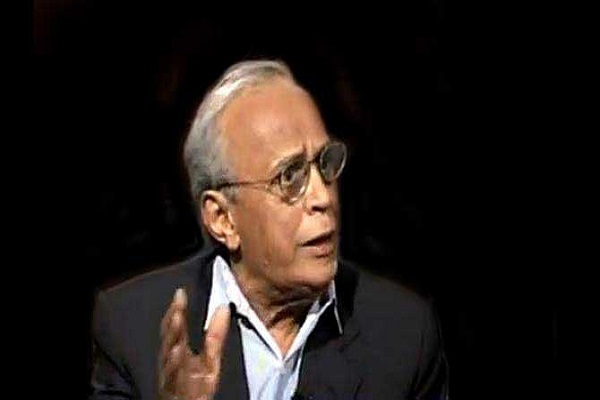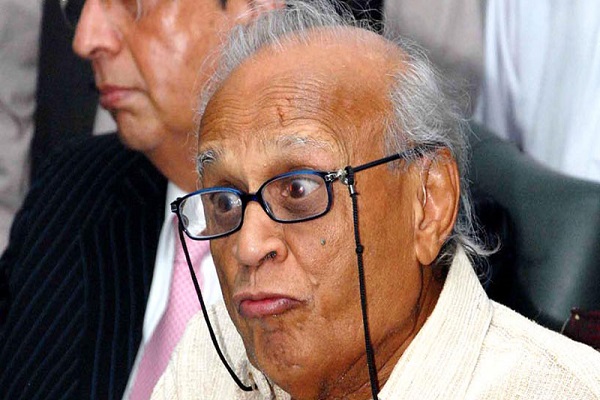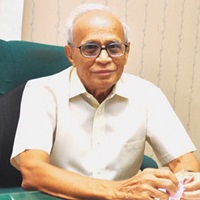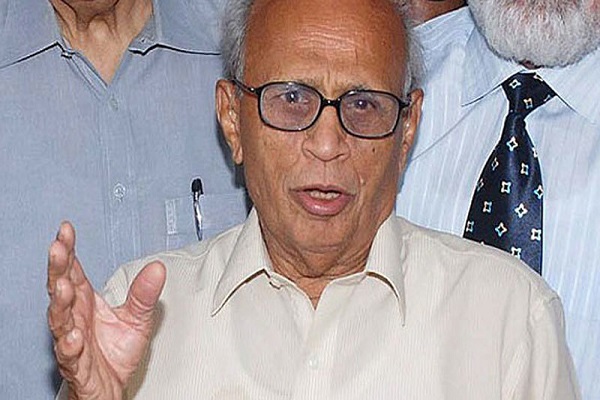Fakhruddin G. Ebrahim was a Pakistan-based legal expert, senior-most lawyer, and an able judge. He got designated as Twenty-fourth Pakistani Chief Election Commissioner on 14th Jul 2012, the post he served until his resignation on 31st Jul 2013.
It’s evidence of his conscience and dedication that most parts of his professional career spent in Pakistan’s service. He performed his duties as Sindh Governor, Supreme Court judge, Chief Election Commissioner (CEC), Federal Law-Minister, and Attorney General. This article contains all the information about him, including Fakhruddin G. Ebrahim Biography.
| Title | Description |
|---|---|
| Personal | |
| Name: | Fakhruddin G. Ebrahim |
| In Urdu: | فخر الدين جى ابراهيم |
| Famous As: | Pakistani judge and a Legal Expert |
| Nationality: | Pakistani |
| Residence: | Karachi |
| Education: | LLB, LLM |
| Religion: | Islam |
| Profession: | Judge and Politician |
| Cabinet : | Benazir Bhutto Government Zulfikar Ali Bhutto Government |
| Alma Mater : | Gujarat Vidyapith Sindh Muslim Law College |
| 18th of Governor : | Sindh Province |
| President : | Ghulam Ishaq Khan |
| Prime Minister: | Benazir Bhutto |
| Succeeding : | Mahmoud Haroon |
| 2nd Attorney General of Pakistan: | In office 20 December 1971 – 5 July 1977 |
| President : | Zulfikar Ali Bhutto, Fazal Ilahi Chaudhry |
| Prime Minister : | Zulfikar Ali Bhutto |
| Deputy : | Yahya Bakhtiar |
| Preceded by : | Syed Sharifuddin Pirzada |
| Succeeded by : | Syed Sharifuddin Pirzada |
| Born | |
| Date: | 12 February 1928 |
| Place: | Ahmedabad, Bombay Presidency, British India |
Table of Contents
Fakhruddin G. Ebrahim Biography
Despite having a glorious career, he was the epitome of humility and honesty. He always called the law a bottomless pit where one never ceases learning. As an advocate, he represented workers and laborers, illegally arrested prisoners and heads of the religious minorities.
In Pakistan’s history, he was 1st Pakistani who stood by his constitutional-oath and refused to surrender to the military regime’s pressure. His purity and simplicity of heart were exemplary. When political parties enthusiastically approved his CEC appointment, he realized that his people expect a lot from him.
The fact that political parties in Pakistan agreed on the one person to oversee the general election 2013 is evidence of the reputation he gained in his professional life.
Ebrahim Date of Birth
He was born on 12th Feb 1928 in Ahmedabad, Bombay.
Education of Ebrahim
He secured his Law degree with distinctions from Gujarat Vidyapith in 1949. During his stay at Gujarat Vidyapith, he studied philosophy courses and attended all lectures delivered by Mohandas Gandhi. These lectures played a significant role in his defense career for nonviolence.
He came to Pakistan in 1950 and secured his LLM degree from Sindh Muslim Law-College, and in 1960 he received a Juris Doctor degree.
Career
Interim Justice Minister and Law Minister
He performed his duties as acting Law Minister from 18th Jul 1993 to 19th Oct 1993 and as interim ‘Justice-Minister’ from 5th Nov 1996 to 17th Feb 1997.

Services to Pakistan Supreme Court
He was also known as a peace-activist. During his judiciary career, he served as Pakistan Supreme Court’s Associate Justice and Senior-Advocate, and in 1988, PM Benazir Bhutto appointed him Sindh Governor.
Refusal to Fresh Oath
In March 1981, during his services as ad-hoc judge of Pakistan Supreme Court, he, along with Chief-Justice Sheikh Anwar-ul-Haq and Justice Dorab Patel, refused for a fresh oath under PCO (Provisional Constitutional Order) enforced by Gen Zia-ul-Haq.
The Provisional Constitutional Order denied the Judiciary’s independence and extended the martial law by negating the judgment’s effect giving the regime of Gen Zia limited recognition.
Established CPLC
He established CPLC (Citizen Police Liaison Committee) in 1989. This Committee functions in Karachi city and helps natives register the FIR if Police refuses it for some reason.
Law Firm
He headed a law firm of ‘Fakhruddin G. Ebrahim and Company,’ a legal practice set up in Bombay. In 1951 the firm shifted to Karachi.
Services to PCB
He had long terms with PCB (Pakistan Cricket Board). The PCB in 1995 started an investigation under Ebrahim’s chairmanship to view the accusations made by Mark Waugh and Shane Warne regarding ODI played in Rawalpindi, and 1st Test match between Australia and Pakistan played in 1994 in Karachi.

These Australian players blamed Salim Malik for making bribe offers to them that they rejected. The inquiry became ineffective as two players weren’t willing to come to Pakistan to provide evidence. An investigation had to be made based on their statements and Saleem’s cross-examination. In Oct 1995, the inquiry commission decided that all these allegations were baseless and unfounded.
Chairperson of PCB’s Anti-Doping Appeals Committee
In Dec 2006, he contributed his services to PCB as chairperson of its ‘Anti-Doping Appeals Committee’ that acquitted Muhammad Asif and Shoaib Akhtar.
Fakhruddin G. Ebrahim Death
He passed away in Karachi on 7th Jan 2020 and was embedded at Mewa Shah Graveyard.

